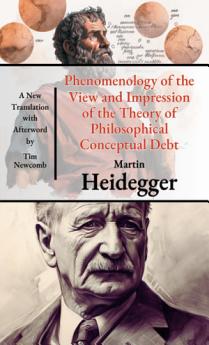Phenomenology of the View and Impression of the Theory of Philosophical Conceptual Debt
May 2024 · The Collected Early Works of Martin Heidegger Book 20 · Minerva Heritage Press
Ebook
266
Pages
family_home
Eligible
info
reportRatings and reviews aren’t verified Learn More
About this ebook
A new translation of Martin Heidegger's early work "Phenomenology of the View and Impression of the Theory of Philosophical Conceptual Debt" (original German title "Phanomenologie der anschauung und des auddrucks theorie der philosophischen Begriffsbuldung"), originally published in 1919. This edition contains a new afterword by the Translator, a timeline of Heidegger's life and works, a philosophic index of core Heideggerian concepts and a guide for terminology across 19th and 20th century Existentialists. This translation is designed for readability and accessibility to Heidegger's enigmatic and dense philosophy. Complex and specific philosophic terms are translated as literally as possible and academic footnotes have been removed to ensure easy reading. Heidegger's work critically examines the role and function of a "theory of philosophical concept formation" in phenomenology, suggesting that this topic, while seemingly specialized, is essential for understanding broader philosophical issues. The text debates the nature and implications of phenomenological methods, touching on topics like the relationship between absolute and relative concepts, the problem of life as a central phenomenon, and the dichotomy between rational and irrational elements in philosophy. It also explores historical and cultural contexts in philosophy, analyzing how these aspects influence philosophical thinking and concept formation. Heidegger focuses on phenomenological destruction (Destruktion) in philosophy, particularly in the context of phenomenology. It highlights the importance of understanding the origin and direction of meanings in philosophical concepts, emphasizing that these meanings often point to larger, interconnected contexts. The text stresses that phenomenological destruction is not aimless or arbitrary, but is instead a directed deconstruction that leads into the situation of following preconceptions and the execution of preconceptions, thus arriving at foundational experiences. The text also discusses the phenomenon of "pre-signing" (Vorzeichnung) and "pre-grasping" (Vorgriff), explaining that these are fundamental to understanding how multiple meanings and unity of meaning are characterized and founded. It notes that phenomenological destruction is inherently linked to the act of philosophizing and is not just a methodological tool for limited purposes. This is because philosophy is always an element of factual life experience and not just abstract definitions. Heidegger naturally pivots back to the understanding of history in various contexts, outlining six different meanings of 'history' and how each reflects different aspects of life experience and philosophical inquiry. These meanings range from history as a field of study, to a tradition, to personal or city history, and even to history as an occurrence or incident. This exploration serves to illustrate the complexity and richness of phenomenological analysis in philosophy.
About the author
Martin Heidegger (1889-1976) was a German philosopher and one of the most influential thinkers of the 20th century, particularly in the fields of phenomenology, existentialism and Ontochronology. His seminal work, Being and Time (Sein und Zeit), introduces the concept of "Dasein," or "being-there," as a way to explore the nature of human existence, focusing on temporality and the meaning of being. Heidegger challenged traditional Western metaphysics by emphasizing the situatedness of human beings within their world, a concept he described as "being-in-the-world." Though his brief association with the Nazi party has cast a shadow over his legacy, Heidegger's ideas have profoundly impacted disciplines such as philosophy, psychology, literature, and theology. His critiques of technology and "technological thinking" continue to resonate in contemporary discussions on modernity, alienation, and the essence of human existence.
Rate this ebook
Tell us what you think.
Reading information
Smartphones and tablets
Install the Google Play Books app for Android and iPad/iPhone. It syncs automatically with your account and allows you to read online or offline wherever you are.
Laptops and computers
You can listen to audiobooks purchased on Google Play using your computer's web browser.
eReaders and other devices
To read on e-ink devices like Kobo eReaders, you'll need to download a file and transfer it to your device. Follow the detailed Help Center instructions to transfer the files to supported eReaders.











